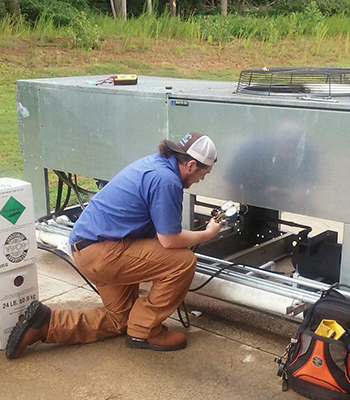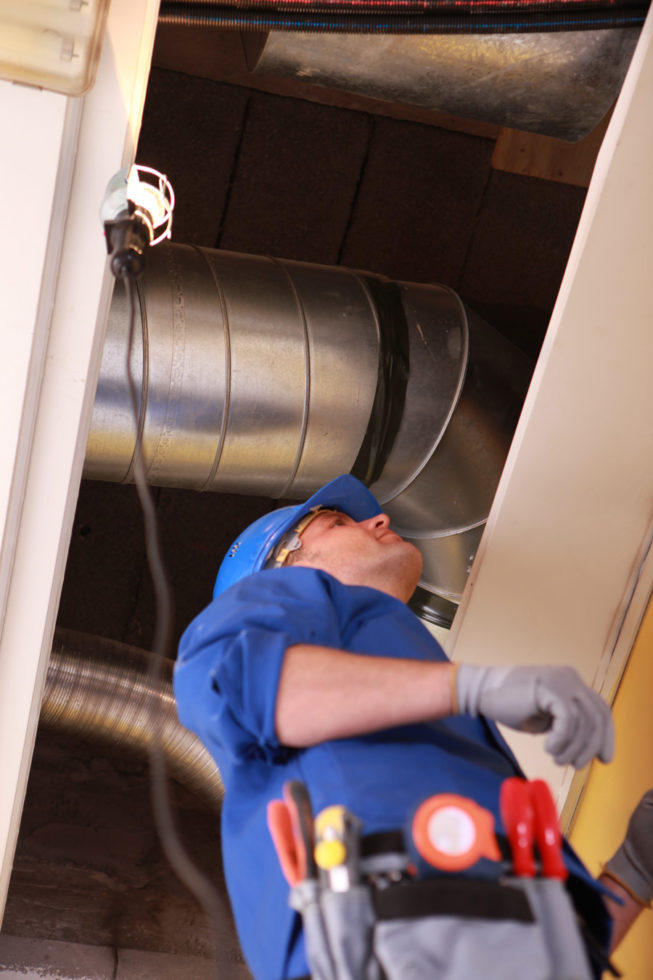Located along the east coast, North Carolina experiences lots of rain, hot summers, and a moderate amount of cold, snowy weather, particularly in the mountain regions.
A career in HVAC in North Carolina is a great choice since HVAC systems are always in demand. If you are considering getting an HVAC license, we’ve got the information you need.

How to Become an HVAC Technician in North Carolina
An HVAC career could be rather fast-paced and rewarding, which is why more and more young people are now interested in opening up an HVAC business or want to be associated with them as an HVAC technician. If you wish to pursue this line of a career in North Carolina, you would require an HVAC license.
How to Get HVAC License in NC
Your education is the first and foremost step on your journey to becoming an HVAC contractor or technician. You can go for a certificate or an associate’s degree. It will help you in gaining the required knowledge and skill that will later come in handy on your projects.
As expected, the experience is also an integral milestone of this journey. If you seek a refrigeration license, you need at least 4000 hours of experience in commercial refrigeration. The good news is that your technical or academic training can cover half of this. However, the other half has to be completed under the apprenticeship of a licensed HVAC contractor or an engineer.
However, if you opt to sit for a contractor’s exam, be it for any kind of heating or cooling equipment license, you would be required to show two years of site experience. A standard HVAC exam will require you to work at least 3000 hours on-site, and the rest can be covered under training.
There is a licensing exam that has four parts. You need to clear them all in a year if you want to get your license. Your heating and cooling license will be issued by the North Carolina State Board of Examiners of Plumbing, Heating and Fire Sprinkler Contractors, whereas the State Board of Refrigeration Contractors is in charge of the refrigeration license.
NC HVAC License Requirements
To obtain an HVAC license, you just have five fundamental requirements that are listed below:
- Finish an HVAC academic program
- Get your trainee experience of a minimum of 1500 hours
- Sit for the exam to get your license
- Acquire two years of experience working as a full-time licensed HVAC tech
- Obtain your contractor’s license
North Carolina HVAC Test Preparation
You will have to take two tests if you go for an HVAC technician or contractor license. The first one will be four hours long and focus on HVAC equipment and the complementary knowledge required. The second is a business and law test and will be 90 minutes long.
Some people decide to go for a refrigeration contractor’s license as well. This test has four parts; however, all four of them have to be cleared in one year. For this, you will also have to show evidence that you worked 4000 hours in commercial refrigeration.
Where to Find the NC HVAC License Practice Test?
Although you will not get an exact replica of a past paper, practice tests are a great way to boost your confidence and test your knowledge. It will allow you to get the hang of the paper, know what kind of questions to expect and how to manage your time properly. Practice tests can be found online.
How Do I Find a Study Guide For HVAC Licensing Exam in NC?
It goes without saying that preparing well for your exam is crucial. We recommend that you take your time to do that and access as many resources as you can. The North Carolina State Board of Examiners has even compiled a list of references for you to prepare for your exam. That list can be found on the official North Carolina license website.
How Many Questions on the NC HVAC License Exam?
In the HVAC refrigeration license exam, the four exams in total have 100 questions. What’s fortunate is that you are allowed to use whatever book you wish for the duration of your test.

What Makes North Carolina a Great Place to Start an HVAC Career?
An HVAC career could be one of the most stable career choices out there. It pays well, you are usually self-employed, and there’s not much hassle or stress. Moreover, this field is quite interesting, and a lot of young people are stepping into it. Here we will highlight how pursuing an HVAC tech career in North Carolina can be especially rewarding:
Population
North Carolina is the ninth most populated state in the US. Not only that, but there is a dense population there. This means that more and more people are living in houses where they need to get HVAC equipment installed, repaired, or serviced. This, in turn, means lots of employment opportunities.
Weather
Generally, the weather in North Carolina is humid, except for dry winters on the high slopes of the Appalachian Mountains. This means that homes, schools, offices, and any other buildings would need HVAC equipment to counter humidity. While winters are cold and wet, the summers can become too humid.
Schools
North Carolina has some of the best HVAC schools in the country. This means that you could get a quality education that will not only give you knowledge but will also teach you practical skills essential in the field. Some examples of these schools are Central Piedmont Community College, Guilford Technical Community College, and Wake Tech Community College.
Job Outlook and Salary For HVAC in North Carolina
While North Carolina may not be the highest paying state for HVAC techs, it is one of the most favorable places to work as an HVAC tech. Furthermore, 90%of HVAC techs have full-time jobs and make 52% more compared to other trades. The demand is high, and this trend is not expected to see a drop. Moreover, there is no saturation in the market; hence there’s no fierce competition.
What is the Average HVAC Technician Salary in North Carolina?
On a national scale, an HVAC technician earns $45,000 on average annually. The number in North Carolina is a little less; an average HVAC tech earns around $40,000 per year. This number, of course, can go up depending upon your experience and performance.
Entry Level
A fresh HVAC tech is expected to earn around $41,150 annually without any or little prior experience.
Mid-Level
An intermediate level HVAC tech earns $55,700 per year, on average.
Master-Level
A senior HVAC tech could earn well up to $61,900 annually on an average.
Insurance and Tax Information For HVAC Techs in North Carolina
HVAC techs work with heavy and expensive equipment, sometimes in rather risky situations. While the work environment is not dangerous, one can never fully out-rule accidents or injury, especially when dealing with equipment like this.
Therefore, many insurance companies in North Carolina offer different insurance packages to HVAC techs so that they can choose the one that best fits their needs. Some examples are Commercial General Liability, Commercial Property, Errors and Omissions, and Workers Compensation.
Taxes for HVAC techs depend on the kind of job you have and how much you earn over a year. Therefore, there is a large element of subjectivity with this aspect.
North Carolina Cities With Highest Average HVAC Salaries
As mentioned above, North Carolina is one of the most suitable states if you are planning to pursue an HVAC career. Here are some cities that pay the highest to their HVAC techs in North Carolina.
Greensboro
This city will pay an HVAC contractor with the highest salary in North Carolina. The mean salary that an HVAC tech makes in one year is $71,856 and $5,500 in overtime per year. If you are just starting, then your average salary would be $66,596 per year. However, this number can rise to $97,334 when you have over ten years of experience.

Winston-Salem
The second-highest paying city for HVAC techs in North Carolina is Winston-Salem, and it will pay $71,064 per year on an average with the same over time as Greensboro. Its entry-level job pays an average of $65,862 per year. However, with over a decade of experience, it can pay up to $96,261 per year.
Wilson
Wilson is not far behind and has an average wage of $58,193 per year with the same over time as above. There is good growth here as an entry-level job pays $53,933 per year, but you can add over $10,000 or so to that number in the span of six to nine years. Moreover, you can add another $10,000 to your annual salary with an additional couple of years.
People Also Ask
Major aspects of the topic have been covered at length in the article. Following is a compilation of some of the common questions that readers have had while researching HVAC licenses in North Carolina. We strongly advise you to go through them as they will bring further clarity.
How Much Does it Cost For HVAC School in North Carolina?
As you probably would have guessed, this depends a lot on the school in question. However, if we were to give an average cost, that would amount to between $5000 and $8000. If this number is more than you can afford, you should seek help from your school in the form of financial aid programs.
What is the Demand For HVAC Technicians in North Carolina?
There is quite a steady and stable demand for HVAC techs in North Carolina because it’s a year-round job. People don’t face a lot of hurdles in landing a job and are generally satisfied with the work environment and conditions. There is no surplus of HVAC techs in the market, which means there is no harsh competition over every opening.
How Much Does an HVAC Technician Make in Charlotte, NC?
The average salary of an HVAC tech in Charlotte, North Carolina, is $48,018 per year. Your experience has a huge influence on this number.
An entry-level job would pay $44,502; however, an expert with over ten years of experience will make $65,043 per year.

How Long to Get HVAC License North Carolina?
The exact number of years can depend on each individual and how much time they take to prepare for the test. However, generally, the whole process can take approximately three years.
What Type of License is Required in NC For HVAC?
There are two classes of HVAC licenses in North Carolina: contractor license and heating and cooling licenses. If you wish to run an HVAC business, then we suggest you opt for the former.
In the heating and cooling license, there are three further classifications. The H1 license is for water-based heating systems. The H2 license is for forced cooling and heating equipment that is heavier than 15 tons. Lastly, the H3 license is for the same type of equipment as H2, but it should weigh less than 15 tons.
Where to Find North Carolina HVAC Laws?
It is always a good idea to educate yourself on the laws of the line of business that you are planning to enter. For HVAC licensing, you will also have to take a law and business exam. You can find the HVAC laws for North Carolina on the official website for North Carolina licensing under the section ‘Laws and Rules.’
Do I Need a License to Work on HVAC in NC on the Side?
North Carolina is one of the states where a license is mandatory if you want to work as an HVAC tech, either as a primary job or on the side. If you want to work with commercial refrigeration units, then you even need additional licensing.
What is an NC HVAC Certificate?
An HVAC certificate is not to be confused with an HVAC license. A license is granted by the North Carolina State Board of Examiners of Plumbing and shows that an individual has met all the prerequisites to work as an HVAC tech. On the other hand, an HVAC certificate means that the receiver is qualified and well-trained to perform installing, repairing, and any servicing tasks on HVAC equipment.
Nearby HVAC Schools
Here are some HVAC schools in nearby states:


